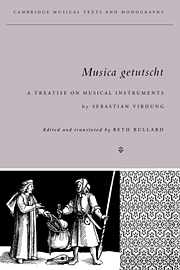Sebastian Virdung's Musica getutscht
Published online by Cambridge University Press: 14 August 2009
Summary
(Sig. [A]) Musica, written in German and extracted [from a larger work] by Sebastian Virdung, priest from Amberg, with [instructions] for learning how to transcribe all song (alles gesang) from the notes into the tablatures of the three instruments named here: the organ, the lute, and the recorder; [instructions] presented in brief form, to honor the illustrious noble prince and lord, Lord Wilhelm, Bishop of Strassburg, his gracious lord.
(Sig. A2) To the illustrious noble prince and great lord, Lord Wilhelm, Bishop of Strassburg and Landgrave of Alsace, his most gracious lord: Sebastian Virdung, priest from Amberg, offers his willing [and] humble service. Noble prince, excellent in [the sight of] God the Father, gracious lord: because at the last Imperial Diet held at Augsburg a year ago your princely grace saw and desired [a copy of] my versified treatise on music in German (mein gedicht derdeutschen musica); and [because] from that time on I have also been repeatedly sought out by your princely grace's chaplain, my old school fellow, who exhorted me and asked me – in letters or else by word of mouth – when I would finally be finished with the book so I [could] publish it; but because a great deal of trouble and expense arises for me daily, due to which this work has been delayed and kept back for so long a time, I thought of extracting a small, abbreviated treatise out of the complete book [to give] pleasure and [to be of] service to a good friend named Andreas Silvanus, who almost overwhelmed me with entreaties to do so.
- Type
- Chapter
- Information
- Musica GetutschtA Treatise on Musical Instruments (1511) by Sebastian Virdung, pp. 95 - 181Publisher: Cambridge University PressPrint publication year: 1993



